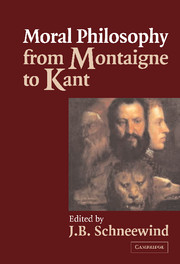Book contents
- Frontmatter
- Contents
- Preface
- Acknowledgments
- Foreword to the One-Volume Reprint
- Introduction
- PROLEGOMENA: SOME QUESTIONS RAISED
- PART I REWORKING NATURAL LAW
- Francisco Suarez
- Hugo Grotius
- Thomas Hobbes
- Richard Cumberland
- Samuel Pufendorf
- John Locke
- PART II INTELLECT AND MORALITY
- PART III EPICUREANS AND EGOISTS
- PART IV AUTONOMY AND RESPONSIBILITY
- Supplemental Bibliography
Thomas Hobbes
Published online by Cambridge University Press: 05 June 2012
- Frontmatter
- Contents
- Preface
- Acknowledgments
- Foreword to the One-Volume Reprint
- Introduction
- PROLEGOMENA: SOME QUESTIONS RAISED
- PART I REWORKING NATURAL LAW
- Francisco Suarez
- Hugo Grotius
- Thomas Hobbes
- Richard Cumberland
- Samuel Pufendorf
- John Locke
- PART II INTELLECT AND MORALITY
- PART III EPICUREANS AND EGOISTS
- PART IV AUTONOMY AND RESPONSIBILITY
- Supplemental Bibliography
Summary
Introduction
The moral philosophy of Thomas Hobbes has been more frequently discussed in the past half century than has that of any other seventeenth-century thinker. There have been a number of different interpretations of what he meant both in general and on specific issues. And many philosophers have tried to show that his basic theory can be understood in a way that shows him to have been essentially right. Indeed, Hobbes transcends his age as few moral and political thinkers ever have.
Hobbes was born in 1588 and died in 1679, a long life at any time and especially in the seventeenth century. He studied at Oxford for five years, becoming acquainted there with Aristotelian philosophy and with extreme Puritan opinions. His rejection of both of these colored much of his later thought. When he was twenty he became a tutor for the Cavendish family, with which he remained closely associated for the rest of his life. The connection enabled Hobbes to travel to the Continent and to meet many scientific and literary leaders of the period, including Bacon and Descartes. He spent much of his time giving himself a humanistic education – his first work was a translation of Thucydides into English – and he did not learn geometry until he was forty. Hobbes's fascination with the demonstrative powers of geometric proof lasted the rest of his life, and he was equally impressed by the physical laws that the new science was revealing to the world.
- Type
- Chapter
- Information
- Moral Philosophy from Montaigne to Kant , pp. 111 - 137Publisher: Cambridge University PressPrint publication year: 2002

